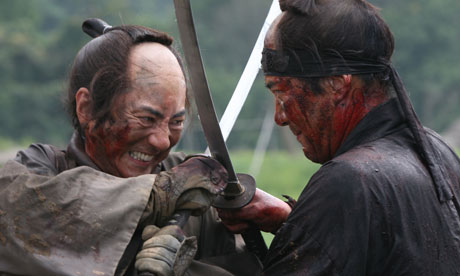
It was two years ago, when I was watching the classic 1963 samurai film 13 Assassins, that I was struck by the sheer power and energy the Japanese film industry possessed in its heyday. But I also immediately felt sad, because we have lost the ability to make films like that. I wanted to resurrect this creative spirit. That's why I decided to do a remake.
I was only three years old when the original came out. It's popular among samurai movie fans – a legendary film for my father's generation, among the many fine chanbara (samurai films) made at the time. Most of all, I love the Zatoichi series about the blind swordsman, especially the first one, from 1962. It's a masterpiece. Then there are the films of Hideo Gosha: Kumokiri Nizaemon (Bandits vs Samurai Squad, 1978) and Yami no Karyudo (Hunter in the Dark, 1979). They are a bit on the B-movie side, but they are interesting, cool and very stylish. And of course Akira Kurosawa's Seven Samurai has to make the list; I don't think any Japanese film-maker can escape the influence of Kurosawa.
I felt that all of us working on our remake of 13 Assassins had to honour the original director, Eiichi Kudo, and everyone else who created the original. It was important to avoid doing what most modern-day chanbara do, which is to insert a love story, or interpose modern-day mindsets. Over the years, people have remade Kurosawa movies, but failed every time because they have not been able to adapt the story into something young audiences can understand.
The story takes place in the 1840s, near the end of the Edo period. But some things never change: mankind is always in pain, no matter what the age, place or political system. I don't need to insert "contemporary themes" into the film – these samurai speak to us even though we are not samurai. That, for me, is the beauty of these period films. Perhaps the samurai genre is unique, even though we Japanese live in an international world where we share the same information and use the same products. But then again, you could compare samurai movies to westerns, in that they're both long-lasting genres in which the characters and the audiences are mainly men. As men, we want to see some kind of ideal of masculinity, even though modern society might restrict us in our own lives.
I wanted to make 13 Assassins in the old manner, to use old techniques and not to rely on modern-day ones such as CGI, or editing that changes the speed. We only had two weeks to film, and the weather up in Yamagata prefecture in the north, where we built the set for the village where the climactic battle takes place, was pretty bad. The actors did surprisingly well, considering that more than half of the main 13 had never held a sword or ridden a horse. They were fighting for their lives as actors.
Have I managed to resurrect the genre? Maybe 13 Assassins is the mortal agony and death rattle of a Japanese film industry that has abandoned its creative talent. But I've got another chanbara on the way, which I'm editing for Cannes right now. It's called Hara-Kiri: Death of a Samurai, and is based on the 1962 film by the famous director Masaki Kobayashi. And it's going to be in 3D. As a film-maker, it's only natural to feel happy about new possibilities opening up. I picture myself 20 years from now, when 3D is the norm, telling my grandkids: "In the old days, we actually argued about whether 2D was better."
Takashi Miike was talking to Phil Hoad.


